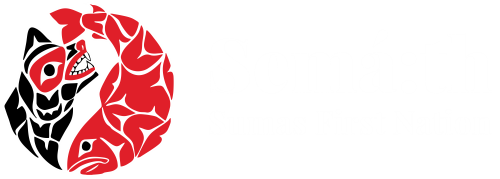Semá:th Leadership Question Industry Practices and Continue to Fight Against TMX Pipeline Expansion in the Area
Semá:th Territory, Abbotsford, BC, June 15, 2020
Semá:th/Sumas First Nation, in partnership with supporting Nations, pledges to continue opposition to TMX pipeline expansion. Semá:th works alongside other Nations who oppose the project and questions why there is a lack of meaningful consultation and accommodation with First Nations by industry. In the wake of a large oil spill in Semá:th territory, there remains serious concerns about timely notice of spills, cleanup efforts, environmental monitoring, transparency, and First Nation involvement.
Sometime early morning on June 13th, a large oil spill occurred at the Trans Mountain site in Abbotsford, which pumps up to the oil storage facility on Sumas Mountain. The pump station is located near an ancestral Semá:th village site where the Sumas River met the shore of historic Sumas Lake. Oil was released within the Trans Mountain Sumas Pump Station and migrated to the adjacent field being used as pasture for grazing cows, who were moved following the spill.
The field where the oil spilled is located within the area of the aquifer to the Sumas First Nation reserve, indicated Semá:th Chief Dalton Silver. “It is deeply concerning what implications the spill could have on water quality for Semá:th reserve residents, many of whom reported the smell of strong fumes throughout the weekend.” stated Chief Silver.

Trans Mountain stated between “150,000 to 190,000 litres (940-1195 barrels)” of oil were spilled. Involvement of experts and monitoring staff from the Nation was initially limited by Trans Mountain.
“What impact will this large of a spill have on our people? Are people taking into account the cumulative effects of seepage into the ground in this swampy area?” asked Chief Silver.
The Tsleil-Waututh Nation Sacred Trust initiative found that since the 1960s, the Trans Mountain pipeline has not gone longer than 4 years without a spill along its route from Edmonton to Burnaby. “This is the fourth time the pipeline has spilled near the reserve in the last 15 years.” stated Chief Silver. “In 2005, 210,000 litres (1,320 barrels) of oil leaked at the Sumas oil storage facility.”
With plans for TMX pipeline expansion in the area, Semá:th continues to be concerned, and is working to prevent future harm in the area. “The proposed Trans Mountain expansion route would see an additional pipeline crossing one of our sacred sites, Lightning Rock, at two spots. We will do absolutely everything we can to prevent this from happening – an oil spill at Lightning Rock would be horrific for our people.” said Chief Silver.
The June 13th oil spill occurred north-west of Lightning Rock – a cultural site and burial grounds of great significance to Semá:th First Nation and Stό:lō Coast Salish Peoples. The existing pipeline and planned expansion route run directly adjacent to the east side of the site, overlooking the Sumas Lake basin. Historically, the Semá:th First Nation relied on the Sumas Lake’s supply of food, and location for summer stilt housing in the middle of the Lake as shelter from mosquitos. Sadly, Sumas Lake was drained in the 1920s to create farmland for settlers, displacing the Semá:th people and irreparably changing their way of life.
Following the June 13th oil spill, Trans Mountain shut off the pipeline but, it was turned on the next day without notice given to Semá:th First Nation. “Semá:th is receiving mixed messages and sporadic communication about ongoing cleanup and return to work. We’re not getting the answers we’ve asked. How is it that two days following the incident, and we’re still trying to get our monitors on site? By the time this happens there won’t be anything left to inspect.” said Chief Silver. A lack of transparent communication between industry and First Nations raises questions moving forwards.
Semá:th First Nation is deeply concerned about ground water, air quality, monitoring, assessment, protection of sacred sites, and involvement of Semá:th in all areas of land and natural resource work. “It’s the direction of my people that we need to oppose the expansion because we’re thinking about the future. What is going to be here when we’re not?” stated Chief Silver.
The battles are ongoing for Semá:th First Nation to rebuild autonomy and prosperity following our unjust displacement to the reserve system. The recent oil spill is yet another marker of the harms Indigenous people endure today. We cannot continue to have our land desecrated by oil spills. We must remain strong, and resilient.
Let’s Emot- One Heart, One Mind.








